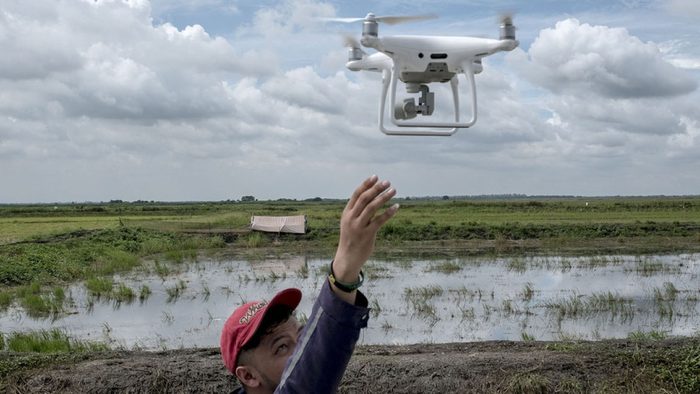Good morning, this is Zelda, inviting you to reflect on the future of technology. We'll consider our readiness to engage and benefit from frontier technologies as UNCTAD publishes its 2021 Technology and Innovation report. And what better opportunity to test their application than EPFL's Applied Machine Learning Days. Innovation could also very well reside in schools, if we think of robots as the future of education.
Finally, if you are feeling nostalgic, a new AI can help you bring your loved ones back to life. |
|
Science & Technology News
|
|

A team of experts from the Philippines department of agriculture use drones to gather visual data on damaged rice crops in the Pampanga province. / © FAO/Veejay Villafranca. Source: UNCTAD.
|
|
Frontier technologies are redefining the world.
Frontier technologies, such as artificial intelligence (AI), robotics, blockchain or nanotechnology, play an essential role in achieving the sustainable development goals (SDGs). Yet, they also represent a risk in increasing inequalities, especially in developing countries.
Geneva Solutions (EN)
|
|
Here's what else is happening
|
|
Anticipatory reads by GESDA
|
|
|
According to a in-depth review of science articles published over the last five years on the affective responses people experience toward climate change, done by psychologist of the University of Geneva (see below), “communication based on fear or hope must be carefully measured in order to avoid any stagnation of citizen action – people might feel a sense of helplessness that makes them think it's already too late anyway, so what's the point of changing your habits? –, and that actions in favor of sustainable development can trigger a virtuous circle of behavior in making their authors feel a sense of pride which pushes them to continue on this path”, says the press release.
This is obviously not only valid for climate change, but for health issues as well. Marcel Tanner, president of the Swiss Academies of Sciences, stated clearly a few days ago his critics that the Swiss National COVID-19 Task Force was putting a lot of emphasis on worst-case-scenarios, and should communicate more about good news - which the Swiss Federal Office of Public Health did last Friday.
Now that, in Switzerland, some experts wish to see the creation of a Climate Task Force similar to the Covid-19 one, these aspects around communication and emotions should taken into more consideration, if not fostered, as the University of Geneva scientists underline: “Research on emotional climate change communications and interventions has made substantial progress in this direction over the last five years, but would benefit from a stronger integration of theoretical concepts and empirical findings from affective psychology. Explicitly considering the mechanisms by which emotions are elicited and the pathways by which they influence decisions and actions may help design more efficient affective interventions. The field would moreover benefit from a stronger integration of neurophysiological approaches to assess the impact of emotional climate messages on neural regions involved in appraisal, emotion, and decision-making [...] Finding ways to harness positive emotions and warm glow as motivators of pro-environmental behavior is a promising avenue for future research.”
- Olivier Dessibourg
|

This selection is proposed by the Geneva Science and Diplomacy Anticipator
GESDA, working on
anticipating cutting-edge science and technological advances to develop innovative and inclusive
solutions for the
benefit of the planet and its inhabitants.
|
|
GS news is a new media project covering the world of international cooperation and development. Don’t hesitate to forward our newsletter!
Have a good day!
|

|
|
Avenue du Bouchet 2
1209 Genève
Suisse
|
|
|
| |










